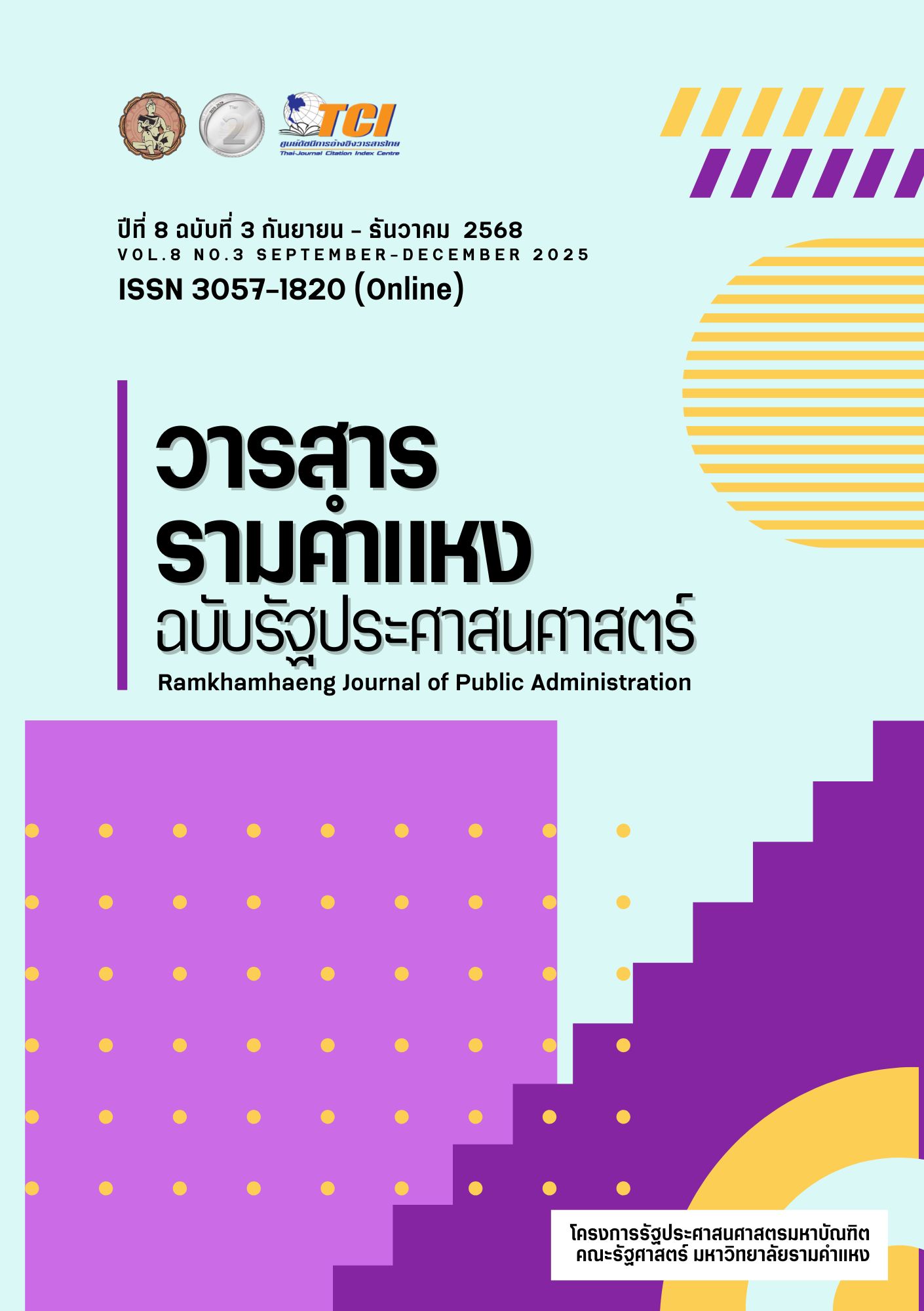ปัจจัยที่มีอิทธิพลต่อการมีส่วนร่วมทางการเมืองของเยาวชน
คำสำคัญ:
ปัจจัยที่มีอิทธิพล, การมีส่วนร่วมทางการเมือง, เยาวชนบทคัดย่อ
การวิจัยครั้งนี้ มีวัตถุประสงค์เพื่อ (1) ศึกษาความแตกต่างระหว่างปัจจัยภูมิหลังของเยาวชนกับการมีส่วนร่วมทาง การเมืองของเยาวชน (2) ศึกษาความสัมพันธ์ระหว่างการมีส่วนร่วมทางการเมืองของเยาวชน ลักษณะบุคลิกภาพห้าองค์ประกอบ ความหมายในชีวิต และการใช้สื่อ (3) ศึกษาปัจจัยที่มีอิทธิพลต่อการมีส่วนร่วมทางการเมืองของเยาวชน ได้แก่ ปัจจัยลักษณะบุคลิกภาพห้าองค์ประกอบ ปัจจัยความหมายในชีวิต ปัจจัยการใช้สื่อ ทั้งนี้ ได้ใช้รูปแบบการวิจัยเชิงสำรวจแบบตัดขวาง โดยอาศัยแบบสอบถาม (questionnaire) เป็นเครื่องมือการวิจัย โดยมีหน่วยวิเคราะห์ คือ เยาวชนที่ศึกษาในมหาวิทยาลัยอายุระหว่าง 18-29 ปี จำนวน 400 คน ดำเนินการสุ่มตัวอย่างแบบเจาะจง เพื่อเก็บแบบ สอบถาม ได้ใช้การวิเคราะห์ถดถอยพหุคูณ (multiple regression analysis) และวิธีคัดเลือกแบบขั้นตอน ในการทดสอบสมมติฐาน ผลจากการวิจัยพบว่า 1. ด้านภูมิหลังของเยาวชนด้านรายได้ต่อเดือนที่แตกต่างกันส่งผลให้การมีส่วนร่วมทางการเมืองแตกต่างกันอย่างมีนัยสำคัญทางสถิติ 2. มีความสัมพันธ์ระหว่างปัจจัยด้านลักษณะบุคลิกภาพห้าองค์ประกอบ ความหมายในชีวิต และการใช้สื่อกับการมีส่วนร่วมทางการเมืองของเยาวชน 3. ปัจจัยด้านลักษณะบุคลิกภาพห้าองค์ประกอบ ความหมายในชีวิต และการใช้สื่อมีอิทธิพลต่อการมีส่วนร่วมทางการเมืองของเยาวชน
เอกสารอ้างอิง
Ahlskog, R. (2023). Extraversion probably does not cause political participation: Evidence from two genetically informed designs. Political Psychology, 44(6), 1301–1318. https://doi.org/10.1111/pops.12901
Alelaimat, M. S. (2019). Factors affecting political participation (Jordanian universities students’ voting: field study 2017–2018). Review of Economics and Political Science, 8(1), 54–67. https://doi.org/10.1108 /REPS-05-2019-0072
Alhassan, A., Siakwa, M., Kyereme, K. A., & Wombeogo, M. (2020). Barriers to and facilitators of nurses’ political participation in Ghana. Policy, Politics, & Nursing Practice, 21(1) 29–42. https://doi.org/10.1177 /1527154419899602
Badescu, G., & Sum, P. E. (2024). What’s your source?: Estimating the effects of media on youth political engagement in Southeast Europe. Journal of Southeast European and Black Sea Studies, 20, 1–23.
Baumeister, R. F. (1991). Meanings of life. New York: Guilford Press.
Brady, H. E., Verba, S., & Schlozman, K. L. (1995). Beyond SES: A resource model of political participation. The American Political Science Review, 89(2), 271–294. https://doi.org/10.2307/2082425
Cherry, K. (2017, April 5). The big five personality dimensions 5 major factors of personality.
https://psych532.files.wordpress.com/2017/04/cherry _about_ fivefactor_nodate.pdf
Chryssochoou, X., & Barrett, M. (2017). Civic and political engagement in youth: Findings and prospects. Zeitschrift fur Psychologie, 225(4), 291–301. https://doi.org/10.1027/2151-2604/a000315
Cooper, C. A., Golden, L., & Socha, A. (2013). The big five personality factors and mass politics. Journal of Applied Social Psychology, 43(1), 68–82.
Damon, W., Menon, J., & Bronk, K. C. (2003). The development of purpose during adolescence. Applied Developmental Science, 7(3), 119–128. https://doi.org/10.1207/S1532480XADS0703_2
Ekstrom, M. (2015). Young people’s everyday political talk: A social achievement of democratic engagement. Journal of Youth Studies, 19(1), 1–19. https://doi.org/10.1080/13676261.2015.1048207
Eriksson, M., & Mittelmark, M. B. (2017). Chapter 12 the sense of coherence and its measurement. In M. B. Mittelmark, S. M. Sagy, G. F., Bauer, J. M., Pelikan, B., Lindstrom, & G. A. Espnes, (eds.), The handbook of salutogenesis (pp. 97–106). Switzerland: Springer.
Fox, R. L., & Lawless, J. L. (2014). Uncovering the origins of the gender gap in political ambition. American Political Science Review, 108(3), 499–519. https://doi.org/10.111l/pops.12600
GDNET Research Communications. (2010, June 4). What is the media and how does it work. https://assets.publishing.service.gov.uk/media/57a08 acae5274a27 b2000785/Using_Media_to_communciate_research_output.pdf
George, L., & Park, C. L. (2016). Meaning in life as comprehension, purpose, and mattering: Toward integration and new research questions. Review of General Psychology, 20(3), 205–220. https://doi.org/10.1037/gpr0000077
Janusz, A., & Campos, L. A. (2021). Candidate advertisements and Afro–Brazilian political marginalization. Latin American Research Review, 56(4), 761–778. https://doi.org/10.25222/larr.888
Kim, Y., Hsu, S. H., & de Zuniga, H. G. (2013). Influence of social media use on discussion network heterogeneity and civic engagement: The moderating role of personality traits. Journal of Communication, 63, 498–516. https://doi.org/10.1111/jcom.12034
Kipkoech, G. (2023). Connections between internet, social media news use, and political participation in Kenya. Social Science Computer Review, 41(3), 871–885. https://doi.org/10.1177/08944393211058702
ดาวน์โหลด
เผยแพร่แล้ว
รูปแบบการอ้างอิง
สัญญาอนุญาต
ลิขสิทธิ์ (c) 2025 กัลยาณัฐ วงษ์กำปั่น

อนุญาตภายใต้เงื่อนไข Creative Commons Attribution-NonCommercial-NoDerivatives 4.0 International License.



